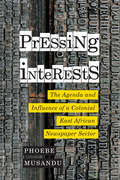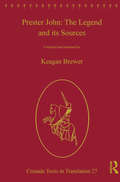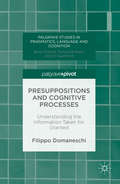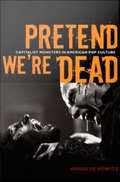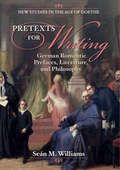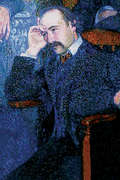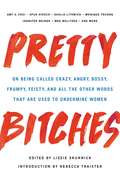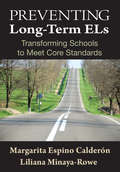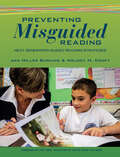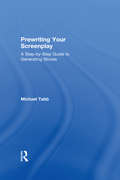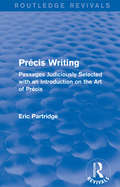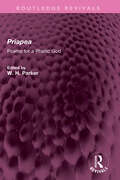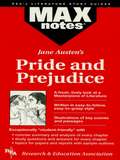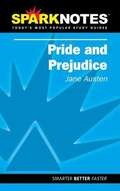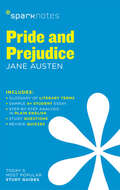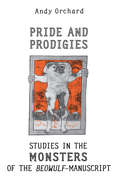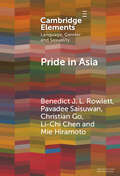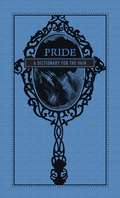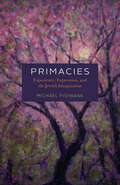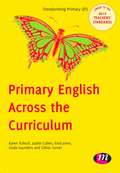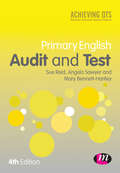- Table View
- List View
Pressing Interests: The Agenda and Influence of a Colonial East African Newspaper Sector
by Phoebe MusanduDuring the first six decades of the twentieth century, when the majority of present-day Kenya was under the control of the British Empire, many secular newspapers emerged as the products of tensions between Asian and European immigrants, the British administration, and the African petite bourgeoisie. In Pressing Interests Phoebe Musandu shows that, far from expressions of public opinion or vehicles of a free market, these periodicals served as powerful tools for the colonial government and the elite to shape political and economic conditions in their favour. <P><P> Following the development of the most important newspapers established in colonial Kenya as they evolved to reflect the priorities and ambitions of their owners, investors, publishers, journalists, and editors, Pressing Interests explores the roles and contributions of the press in the country's political and economic history. Shedding light on newspapers as business ventures, Musandu focuses on the management, financial, and production aspects of media. Drawing on previously unearthed archival documents, official and unofficial correspondence, police and legal records, and the newspapers themselves, she further examines the press as a medium for inter- and intra-racial competition for power and influence, as a base for the production of knowledge, and as an instrument for social control. <P><P> In an era when we are often reminded of the power inherent in the ability to generate and disseminate information, Pressing Interests tells the story of colonial Kenya's press through a timely mix of riveting accounts and the clarifying lens of careful analysis.
Prester John: The Legend and its Sources (Crusade Texts in Translation)
by Keagan BrewerThe legend of Prester John has received much scholarly attention over the last hundred years, but never before have the sources been collected and coherently presented to readers. This book now brings together a fully-representative set of texts setting out the many and various sources from which we get our knowledge of the legend. These texts, spanning a time period from the Crusades to the Enlightenment, are presented in their original languages and in English translation (for many it is the first time they have been available in English). The story of the mysterious oriental leader Prester John, ruler of a land teeming with marvels who may come to the aid of Christians in the Levant, held an intense grip on the medieval mind from the first references in twelfth-century Crusader literature and into the early-modern period. But Prester John was a man of shifting identity, being at different times and for different reasons associated with Chingis Khan and the Mongols, with the Christian kingdom of Ethiopia, with China, Tibet, South Africa and West Africa. In order to orient the reader, each of these iterations is explained in the comprehensive introduction, and in the introductions to texts and sections. The introduction also raises a thorny question not often considered: whether or not medieval audiences believed in the reality of Prester John and the Prester John Letter. The book is completed with three valuable appendices: a list of all known references to Prester John in medieval and early modern sources, a thorough description of the manuscript traditions of the all-important Prester John Letter, and a brief description of Prester John in the history of cartography.
Presuppositions and Cognitive Processes
by Filippo DomaneschiThis book breaks new ground towards an understanding of the mental processes involved in presupposition, the comprehension of information taken for granted. Various psycholinguistic experiments are discussed to support the idea that involved in ordinary language comprehension are complex and demanding cognitive processes. The author demonstrates that these processes exist not only at the explicit level of an utterance but also at a deeper level of computing, where the background information taken for granted as already known and shared between interlocutors is processed. The author shows that experimental research can suggest new theoretical models for presupposition, thus this book will be of interest to researchers and students of psycholinguistics, the philosophy of language and experimental pragmatics.
Pretend We're Dead: Capitalist Monsters in American Pop Culture
by Annalee NewitzIn Pretend We're Dead, Annalee Newitz argues that the slimy zombies and gore-soaked murderers who have stormed through American film and literature over the past century embody the violent contradictions of capitalism. Ravaged by overwork, alienated by corporate conformity, and mutilated by the unfettered lust for profit, fictional monsters act out the problems with an economic system that seems designed to eat people whole. Newitz looks at representations of serial killers, mad doctors, the undead, cyborgs, and unfortunates mutated by their involvement with the mass media industry. Whether considering the serial killer who turns murder into a kind of labor by mass producing dead bodies, or the hack writers and bloodthirsty actresses trapped inside Hollywood's profit-mad storytelling machine, she reveals that each creature has its own tale to tell about how a freewheeling market economy turns human beings into monstrosities. Newitz tracks the monsters spawned by capitalism through b movies, Hollywood blockbusters, pulp fiction, and American literary classics, looking at their manifestations in works such as Norman Mailer's "true life novel" The Executioner's Song; the short stories of Isaac Asimov and H. P. Lovecraft; the cyberpunk novels of William Gibson and Marge Piercy; true-crime books about the serial killers Ted Bundy and Jeffrey Dahmer; and movies including Modern Times (1936), Donovan's Brain (1953), Night of the Living Dead (1968), RoboCop (1987), The Silence of the Lambs (1991), and Artificial Intelligence: AI (2001). Newitz shows that as literature and film tell it, the story of American capitalism since the late nineteenth century is a tale of body-mangling, soul-crushing horror.
Pretense and Pathology
by Armour-Garb, Bradley and Woodbridge, James A. Bradley Armour-Garb James A. WoodbridgeIn this book, Bradley Armour-Garb and James A. Woodbridge distinguish various species of fictionalism, locating and defending their own version of philosophical fictionalism. Addressing semantic and philosophical puzzles that arise from ordinary language, they consider such issues as the problem of non-being, plural identity claims, mental-attitude ascriptions, meaning attributions, and truth-talk. They consider 'deflationism about truth', explaining why deflationists should be fictionalists, and show how their philosophical fictionalist account of truth-talk underwrites a dissolution of the Liar Paradox and its kin. They further explore the semantic notions of reference and predicate-satisfaction, showing how philosophical fictionalism can also resolve puzzles that these notions appear to present. Their critical examination of fictionalist approaches in philosophy, together with the development and application of their own brand of philosophical fictionalism, will be of great interest to scholars and upper-level students of philosophy of language, metaphysics, philosophical logic, philosophy of mind, epistemology, and linguistics.
Pretexts for Writing: German Romantic Prefaces, Literature, and Philosophy (New Studies in the Age of Goethe)
by Seán WilliamsAround 1800, print culture became a particularly rich source for metaphors about thinking as well as writing, nowhere more so than in the German tradition of Dichter und Denker. Goethe, Jean Paul, and Hegel (among many others) used the preface in order to reflect on the problems of writing itself, and its interpretation. If Sterne teaches us that a material book enables mind games as much as it gives expression to them, the Germans made these games more theoretical still. Weaving in authors from Antiquity to Agamben, Williams shows how European–and, above all, German–Romanticism was a watershed in the history of the preface. The playful, paradoxical strategies that Romantic writers invented are later played out in continental philosophy, and in post-Structuralist literature. The preface is a prompt for playful thinking with texts, as much as it is conventionally the prosaic product of such an exercise. Published by Bucknell University Press. Distributed worldwide by Rutgers University Press.
Pretexts: Reflections on Literature and Morality
by Andre GideMost of Andre Gide's richly-varied literary output has long been available to American readers. Only one aspect of his protean career has been lacking in translation: the essays, the publication of which will go far to explain why Gide holds in France such high rank as a critic. Many of the essays in Pretexts: Reflections on Literature and Morality were provoked by events in the cultural and political world of twentieth-century France, a turbulent setting that produced a lasting literature. These essays are vintage Gide, informed by his characteristic spirit his hard brilliance, pointed honesty, and the enduring relevance of his concerns.Readers of his Journals will be prepared for the style, intelligence, and marksmanship that Gide brings to bear in these forty-two articles on life as well as on letters. His range, as always, is broad: a long and moving memoir of his encounters with Oscar Wilde; a series of combats against reactionary nationalists and self-appointed purifiers of morals; estimates of Mallarme, Baudelaire, Proust, Gautier, and Valery, among others; letters to Jacques Riviere, Jean Cocteau, and Francis Jammes; and general essays on art, literature, the theater, and politics.Justin O'Brien, famous for his studies in modern French literature, has written that Gide is "related to La Fontaine and Racine by his essential conciseness and crystalline style, to Montaigne and Goethe by his inquiring mind which reconciled unrest and serenity, to Baudelaire by his lucid, prophetic criticism." O'Brien, who has done so much to bring contemporary French literature to America, supervised the translations in Pretexts: Reflections on Literature and Morality, prepared several of them himself, and contributes an informative general introduction and additional commentary to preface the various sections of this major book.
Pretty Bitches: On Being Called Crazy, Angry, Bossy, Frumpy, Feisty, and All the Other Words That Are Used to Undermine Women
by Lizzie SkurnickThese empowering essays from leading women writers examine the power of the gendered language that is used to diminish women -- and imagine a more liberated world.Words matter. They wound, they inflate, they define, they demean. They have nuance and power. "Effortless," "Sassy," "Ambitious," "Aggressive": What subtle digs and sneaky implications are conveyed when women are described with words like these? Words are made into weapons, warnings, praise, and blame, bearing an outsized influence on women's lives -- to say nothing of our moods.No one knows this better than Lizzie Skurnick, writer of the New York Times' column "That Should be A Word" and a veritable queen of cultural coinage. And in Pretty Bitches, Skurnick has rounded up a group of powerhouse women writers to take on the hidden meanings of these words, and how they can limit our worlds -- or liberate them. From Laura Lipmann and Meg Wolizer to Jennifer Weiner and Rebecca Traister, each writer uses her word as a vehicle for memoir, cultural commentary, critique, or all three. Spanning the street, the bedroom, the voting booth, and the workplace, these simple words have huge stories behind them -- stories it's time to examine, re-imagine, and change.
Preventing Long-Term ELs: Transforming Schools to Meet Core Standards
by Margarita Espino Calderon Dr Liliana Minaya-Rowe10 keys to keeping English learners from falling through the cracks Students who struggle with English are likely to struggle with academic content throughout their school years. Many drop out. This practical guidebook’s 10 components for success will help educators at all levels close this achievement gap. Included are step-by-step instructions for integrating language, literacy, and subject matter to improve student learning. Key features include: A clearly articulated, evidence-based professional development program for effectively teaching English language learners Research-based coaching practices for improving instruction Ways to implement the program while concurrently meeting core standards and content objectives
Preventing Misguided Reading: Next Generation Guided Reading Strategies
by Jan Burkins Melody M. CroftWith over 50 years of collective reading experience, authors Jan Burkins and Melody Croft bring their expertise to Preventing Misguided Reading: Next Generation Guided Reading Strategies . The authors present personal clarifications, adaptations, and supports that have helped them work through the tricky parts as they guide readers in the classroom. Inside, each of the six chapters clarifies a misunderstanding about guided reading instruction in the following areas: Teacher's Role and Gradual Release of Responsibility Instructional Reading Level Text Gradients Balanced Instruction Integrated Processing Assessment With 27 strategies, Burkins and Croft will help you reframe your way of thinking about teaching reading and act on "revisioning" strategically.
Prewriting Your Screenplay: A Step-by-Step Guide to Generating Stories
by Michael TabbPrewriting Your Screenplay cements all the bricks of a story’s foundations together and forms a single, organic story-growing technique, starting with a blank slate. It shows writers how to design each element so that they perfectly interlock together like pieces of a puzzle, creating a stronger story foundation that does not leave gaps and holes for readers to find. This construction process is performed one piece at a time, one character at a time, building and incorporating each element into the whole. The book provides a clear-cut set of lessons that teaches how to construct that story base around concepts as individual as the writer’s personal opinions, helping to foster an individual writer’s voice. It also features end-of-chapter exercises that offer step-by-step guidance in applying each lesson, providing screenwriters with a concrete approach to building a strong foundation for a screenplay. This is the quintessential book for all writers taking their first steps towards developing a screenplay from nothing, getting them over that first monumental hump, resulting in a well-formulated story concept that is cohesive and professional.
Précis Writing: Passages Judiciously Selected with an Introduction on the Art of Précis (Routledge Revivals: The Selected Works of Eric Partridge)
by Eric PartridgeFirst published in 1940, this book was designed by Eric Partridge to equip students, studying for final exams at school, with the tools they needed to become successful précis-ers. The selection of literary pieces is more diverse than other preìcis books of the time and Partridge’s background as a schoolmaster, a lecturer and a publisher sets him up well to teach the subject.
Priapea: Poems for a Phallic God (Routledge Revivals)
by W. H. ParkerFirst published in 1988, Priapea is a collection of eighty Latin epigrams, English translated, that make up the corpus Priapeorum, which displays remarkable skill, artistry and wit. Their elegance of style contrasts strikingly with their indecent subject matter. The poems are mostly spoken by, or addressed to, the lewd god Priapus, famous for the size and tenseness of his erect membrum virile or phallus. A main theme is the threatened use of his formidable organ to assault obscenely any intruders that he may catch thieving, but requests and offsprings made to Priapus, and his comparison of himself with other deities, also figure prominently among the poems. This book will be of interest of literature, classical studies, and translation studies.
Pride and Prejudice (MAXNotes Literature Guides)
by William BlanchardREA's MAXnotes for Jane Austen's Pride and Prejudice MAXnotes offer a fresh look at masterpieces of literature, presented in a lively and interesting fashion. Written by literary experts who currently teach the subject, MAXnotes will enhance your understanding and enjoyment of the work. MAXnotes are designed to stimulate independent thought about the literary work by raising various issues and thought-provoking ideas and questions. MAXnotes cover the essentials of what one should know about each work, including an overall summary, character lists, an explanation and discussion of the plot, the work's historical context, illustrations to convey the mood of the work, and a biography of the author. Each chapter is individually summarized and analyzed, and has study questions and answers.
Pride and Prejudice (SparkNotes)
by Ross Douthat Molly Haskel Jennifer BurnsSparknotes of Pride and Prejudice, Jane Austen's masterpiece
Pride and Prejudice SparkNotes Literature Guide (SparkNotes Literature Guide Series #55)
by SparkNotesPride and Prejudice SparkNotes Literature Guide by Jane Austen Making the reading experience fun! When a paper is due, and dreaded exams loom, here's the lit-crit help students need to succeed! SparkNotes Literature Guides make studying smarter, better, and faster. They provide chapter-by-chapter analysis; explanations of key themes, motifs, and symbols; a review quiz; and essay topics. Lively and accessible, SparkNotes is perfect for late-night studying and paper writing. Includes:An A+ Essay—an actual literary essay written about the Spark-ed book—to show students how a paper should be written.16 pages devoted to writing a literary essay including: a glossary of literary termsStep-by-step tutoring on how to write a literary essayA feature on how not to plagiarize
Pride and Prejudice and Related Readings
by Jane AustenThe related readings are: Society from What Jane Austen Ate and Charles Dickens Knew by Daniel Pool (social history), The Best Sort of Husband by Susan B. Kelly (short story), Austen Boom Shows an Un-American Craving for Civility by Henry Grunwald (newspaper article), Habitation by Margaret Atwood (poem), and Autres Temps by Edith Wharton (short story). [This text is listed as an example that meets Common Core Standards in English language arts in grades 11-12 at http://www.corestandards.org.]
Pride and Prodigies
by Andy OrchardMonsters and the monstrous, whether from the remote pagan past or the new world of Christian Latin learning, haunted the Anglo-Saxon imagination in a variety of ways. In this series of detailed studies, Andy Orchard demonstrates the changing range of Anglo-Saxon attitudes towards the monstrous by reconsidering the monsters of Beowulf against the background of early medieval and patristic teratology and with reference to specific Anglo-Saxon texts.The immediate manuscript context of the monsters in Beowulf is analysed, shedding light on the poet's treatment of the theme of the monstrous and its integration into his work, and a series of parallel discussions consider a range of medieval treatments of the same theme in a variety of analogous texts (all provided with translation), in Latin, Old English, Middle Irish, and Old Icelandic.The twin themes of pride and prodigies are suggested by tracing changing attitudes towards the concept of pride and establishing a close link between the proud pagan warriors depicted in Christian tradition and the monsters they fight, and with whom they become increasingly identified.An appendix contains new editions and translations (some for the first time in English) of the Liber Monstrorum, The Letter of Alexander to Aristotle, and The Wonders of the East.Originally published in 1995 by Boydell & Brewer.
Pride in Asia: Negotiating Ideologies, Localness, and Alternative Futures (Elements in Language, Gender and Sexuality)
by Benedict J. Rowlett Pavadee Saisuwan Christian Go Li-Chi Chen Mie HiramotoThis Element provides a transregional overview of Pride in Asia, exploring the multifaceted nature of Pride in contemporary LGBTQIA+ events in Thailand, the Philippines, Taiwan, and Hong Kong. This collaborative research that combines individual studies draws on linguistic landscapes as an analytical and methodological approach. Each section examines the different manifestations of Pride as a discourse and the affordances and limitations of this discourse in facilitating the social, political, and cultural projects of LGBTQIA+ people in Asia, illustrating both commonalities and specificities in Asian Pride movements. Analyzing a variety of materials such as protest signs, t-shirts, and media reports, each section illustrates how modes of semiosis, through practice, intersect notions of gender and sexuality with broader social and political formations. The authors thus emphasize the need to view Pride not as a uniform global phenomenon but as a dynamic, locally shaped expression of LGBTQIA+ solidarity.
Pride: A Dictionary for the Vain
by Media AdamsThe Seven Deadly Sins have sliced up the dictionary and taken what's theirs. No one vice is too greedy as each volume prides itself on having more than 500 entries. Word lovers will lust after these richly packaged volumes--and once you've collected all seven, you'll be the envy of all your friends.Pride: A Dictionary for the VainNo one enjoys lording over the uneducated with a pretty pointed vocabulary like the Prideful. Now each and every word they need to describe how much better they are is right at their fingertips.
Primacies: Experience, Expression, and the Jewish Imagination
by Michael FishbaneA powerful exploration of how literature expresses and transforms our earliest preverbal experiences. Primacies begins with the assertion that our earliest preverbal experiences are accompanied by a primary language—a universal expression of tears, cries, and laughter offered long before we learn our distinctive, ordinary languages. For Michael Fishbane, these “primacies” release the raw feelings of our existential condition and catalyze our most powerful literary expressions of sorrow, joy, and fulfillment. In this book, Fishbane explores how ancient, medieval, and modern literature and poetry express and transform these primal sensations. Building on his theological project begun in Sacred Attunement and Fragile Finitude, Fishbane offers here a radically new lived hermeneutics that seeks to do nothing less than redefine the relationship between experience and language.
Primary English
by Jane Medwell David Wray Hilary Minns Vivienne Griffiths Elizabeth CoatesThe 6th edition of this popular core text provides the essential teaching theory and practice for primary English. It promotes effective teaching through secure pedagogical knowledge, covering the key skills of planning, monitoring and assessment and class management, and relating these specifically to primary English. This 6th edition is linked to the 2012 Teachers' Standards. With full coverage of the theory and practice required for effective and creative English teaching, this text is an essential guide for all trainees working towards QTS. Throuhgout, practical guidance and features support trainees to translate this learning to the classroom, embed ICT in their lessons and to understand the wider context of their teaching. Trainees will find it helpful to use this book alongside Primary English Knowledge and Understanding. About the Achieving QTS series All the books in this successful series support trainees through their initial teacher training and guide them in the acquisition of their subject knowledge, understanding and classroom practice. All new titles within the series link to the 2012 Teachers' Standards and take into accont recent changes in Initial Teacher Training. Jane Medwell is an Associate Professor of Education at the Institute of Education, University of Warwick. David Wray is Professor of Literacy Education at the Institute of Education, University of Warwick. Hilary Minns co-ordinates primary English courses in the Institute of Education, University of Warwick. Elizabeth Coates works in the Institute of Education, University of Warwick, where she co-ordinate Early Years courses. Vivienne Griffiths is Professor of Education at Canterbury Christ Church University.
Primary English
by Jane MedwellThe essential subject knowledge text for primary English. Secure subject knowledge and understanding is the foundation of confident, creative and effective teaching. The 5th edition of this popular text has a number of new features including a new self assessment section and M level extension boxes to provide further challenge in all chapters. References to the 2007 QTS Standards and the Early Years Foundation Stage are also included. With full coverage of the English curriculum, and updated research summaries reflecting the latest thinking, this text is written to help trainee primary teachers develop and consolidate their knowledge of English.
Primary English Across the Curriculum (Transforming Primary QTS Series)
by Karen Tulloch Linda Saunders Judith Cullen Gillian Turner Enid JonesThis book supports trainee teachers working towards primary QTS in teaching primary English across all areas of the curriculum. Focused on teaching a more integrated and inclusive curriculum, this text draws out meaningful cross curriculur links and explores how the teaching of English can take place across the whole curriculum. It examines how a teacher's effective use of English is essential in supporting learning in all subjects and considers the role of the teacher in promoting English. Chapters cover topics such as language, literature, EAL and thinking skills. Incorporating the latest thinking in primary English and including exemplars of current good practice, this practical guide encourages trainee teachers to explore learning and teachig in new ways. About the Transforming QTS Series This series reflects the new creative way schools are begining to teach, taking a fresh approach to supporting trainees as they work towards primary QTS. Titles provide full up to date resources focused on teaching a more integrated and inclusive curriculum, and texts draw out meaningful and explicit cross curricular links.
Primary English Audit and Test (Achieving QTS Series)
by Sue Reid Mary Bennett-Hartley Angela SawyerThis popular, widely recommended, text supports trainees on primary initial teacher training courses where a secure knowledge and understanding of English is required for the award of Qualified Teacher Status (QTS). A rigorous and focused test enables trainees to identify their strengths and weaknesses in English. This test can be revisited at key stages in their course as a tool to monitor and evaluate progress. The fourth edition has been updated in line with the new National Curriculum, includes more information on expanding and developing a knowledge of English and is linked to the 2012 Teachers' Standards.
